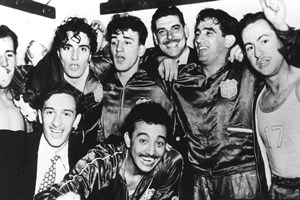
2019 FIBA Basketball World Cup bids - Philippines' basketball history
MIES (2019 FIBA Basketball World Cup) - On Friday 7 August, FIBA's Central Board will decide and announce who of the People's Republic of China or the Republic of the Philippines will host the 2019 FIBA Basketball World Cup.
In the lead-up to the decision, FIBA.com takes a closer look at the proposals made by both countries, focusing on four key areas:
1. Vision and concept
2. Experience in hosting events
3. Basketball history
4. Cities and venues
Here, Samahang Basketbol ng Pilipinas (the basketball federation of the Philippines) provides information about the country's basketball history.
The Philippines love affair with basketball hits new heights
In the lead-up to this week's decision in Tokyo, much has been said about the depth of Filipino passion for the sport. But the outpouring of national support to host the 2019 FIBA Basketball World Cup is not simply restricted to those who live in the country. With more than 10 million Filipinos residing overseas, there's a clear sense that that passion has a truly global presence.
The unique relationship that the Philippines has with basketball transcends the excitement that surrounds the World Cup bid. It is something that has existed for more than a century now, making the sport a part of the national psyche. When Filipinos say that, in the Philippines, "basketball is life", they speak from both the head and the heart.
Basketball first arrived in the Philippines at the turn of the 20th century. Throughout the Colonial period, in which the United States had a powerful foothold in the country, the YMCA is credited for populising the sport. It struck a chord with people from all walks of life and while interest in other 'imported' sports might have faded, the national love for basketball went from strength to strength.
As the Philippines received recognition of independence in 1946, so a more structured approach to the organisation and management of the sport began to take hold. With the exception of the United States, the country had had the longest-standing collegiate league in the world following the establishment of the National Collegiate Athletic Association (NCAA) in 1924. That was followed by the formation of the University Athletic Association of the Philippines (UAAP), in 1938.
On the back of a number of successful campaigns on the international circuit, the Philippine National Basketball Association (PBA) was founded in 1975. And within months of its establishment, the Philippines was awarded the rights to host the 1978 FIBA Basketball World Cup. This became the pivotal point in the development of basketball across the country and of the Philippines' place as a recognised and highly-regarded basketball nation. Since then, in 2013, 150,000 fans enjoyed 11 days of competition during a thrilling FIBA Asia Championship.
Today, that legacy continues. In a recent survey conducted by independent global sports marketing agency Octagon, 80 percent of Filipinos said they were passionate basketball fans and 96 percent said they supported the opportunity to host the 2019 FIBA Basketball World Cup in the Philippines. Meanwhile, 4 in 10 people have played or are currently playing basketball, accounting for 40 percent of the population in the country. The sport is a truly cultural phenomenon.
As the national sport, the public and private sector has injected significant investments into facilities right across the country. From school playgrounds to the Philippine Arena, the world’s largest indoor basketball stadium with a capacity of 55,000, Filipinos now have the opportunity to watch and participate in basketball regardless of location.
And in the lead-up to the 2019 FIBA Basketball World Cup, that investment continues. The SM Arena Cebu will be a brand new state-of-the-art facility with a capacity of 22,000. Part of the SM Seaside City Cebu mall complex made up of a 400-room five-star hotel and a 19,000 square metre convention and exhibition centre, the SM Arena has the backing of one of the largest property asset, retail and development companies in the country, SM Prime Holdings. The company has extensive interests in a number of industries and completed, on-time, the both the SMX Convention Centre and SM Mall of Asia Arena in Manila.
The future of basketball in the Philippines has never looked brighter. The spirit of public/private partnership that sits at the heart of the country's bid will not only help deliver a truly exceptional experience for delegates, fans, teams and players but create significant benefits for residents and visitors long after the final whistle has blown.
Add that extraordinary legacy to the rich history of basketball and a deeply entrenched passion for the sport right across the country, and its easy to understand why all Filipino eyes will be on the FIBA decision in Tokyo this week.




















